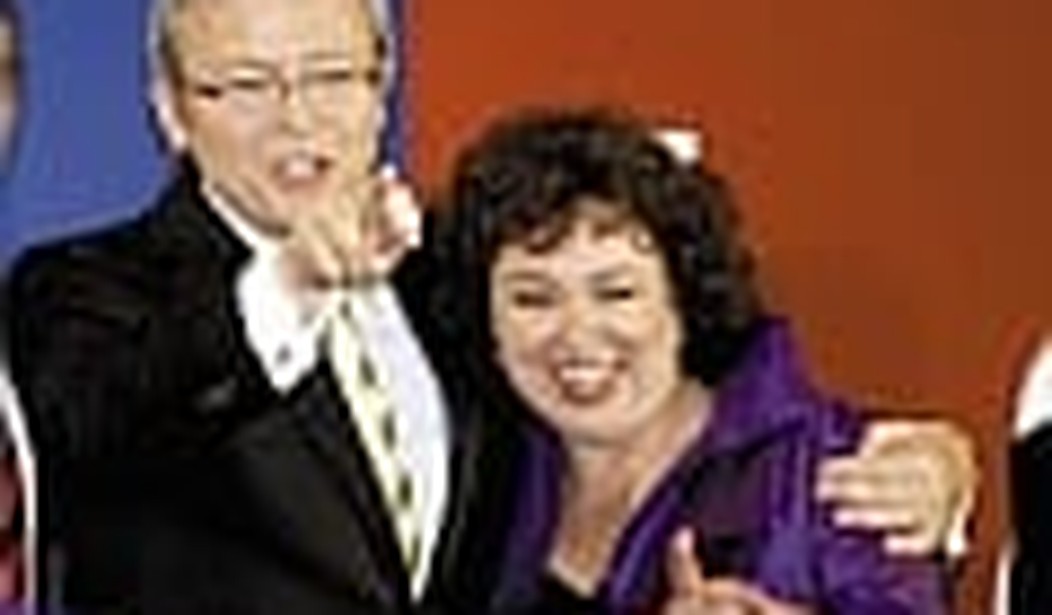For conservatives Down Under, it’s over. The 11-year-old Australian Liberal-National Party government led by Prime Minister John Howard – George Bush’s ‘man of steel’ – was on Saturday, 24 November (Australian time) comprehensively voted out of office.
The national swing of over 5% in yesterday’s vote has brought a young, bright and energetic Queenslander named Kevin Rudd to the job of Prime Minister of Australia, with a comfortable majority for his Labor Party of about 25 seats in the 150-seat federal house of representatives.
The big changes don’t end there. Facing Rudd as Opposition Leader in the new parliament will be not John Howard, but Peter Costello, Howard’s former Treasurer – a brilliant parliamentary performer who for years has been chafing at the bit to take over from Howard as party leader.
Howard probably won’t even be in the new Parliament. While vote-counting is still to be finalised, on present indications he’s almost certainly lost his own seat – only the second time in Australian history that this fate has befallen a sitting Prime Minister. (The first time was in the 1920s.)
This is not quite the ignominious end for Howard that it may appear.
Kevin Rudd defeated him only by first accepting that Howard has permanently changed the ground rules of Australian politics – in a conservative direction. Throughout this campaign, the Labor leader stressed repeatedly that he was an ‘economic conservative’. He didn’t just say that: he gave the claim substance by actually underbidding Howard, by a significant margin, in the amount of pork he was prepared to offer to the electorate in campaign promises.
The other big difference with Rudd, compared with some other Labor leaders of recent years, is that he is essentially unthreatening to mainstream Australian values – including, most importantly, the American alliance. He showed this in his victory speech on Saturday night, which he used as an occasion to send ‘greetings’ to ‘our great friend and ally, the United States’.
For an election-night address in front of the party faithful, this was an unexpected and almost incongruous note to strike. It sends an interesting signal. Labor policy is to withdraw Australian combat troops from Iraq, in ‘consultation’ with the US.
The stress on the value of the alliance in yesterday’s victory speech from Rudd suggested that the word ‘consultation’ is more than just a fig-leaf for a peremptory Australian pull-out. Rudd touched on numerous other key policies that would form his government’s ‘agenda for work’. But he pointedly did not mention Iraq: a glaring absence that must have disappointed the leftist activists in the Labor Party. The manner in which his government handles this issue will be important for its future.
It is important to note here that the election was not any kind of referendum on Australia’s involvement in Iraq. Iraq policy played almost no part in it. The three main areas of policy affecting the result were all domestic: the Howard government’s new workplace legislation (which many workers were convinced gave too much power to employers); education policy (with Rudd promising an ‘education revolution’ involving laptops and high-speed broadband connections in every pot); and climate change policy (where Rudd out-greened Howard).
Iraq was a side-issue at most about which most Australians do not feel passionately one way or the other. They do however have strong feelings about the American alliance overall. Rudd knows this very well.
Given that the Howard years have been a period of continuously increasing prosperity for Australians, Rudd’s political achievement is astonishing. Howard’s key claim in his farewell speech on Saturday night – that the nation was now “stronger and prouder and more prosperous than it was 11 and a half years ago” – is indisputable.
Focus group analysts report that Australians are not in any angry mood. They have no particular reason to be. After burying Howard at the polls, even Rudd went out of his way in his victory speech to praise his defeated rival’s ‘extensive contribution to public service’ in Australia. That was smart.
So what can explain Rudd’s stunning defeat of the formidable Howard? ‘Professional’ and ‘disciplined’ are the words that many of the pundits are using to describe Rudd’s campaign performance. But he is much more of a phenomenon than those words suggest.
In the months before the campaign that ended in yesterday’s triumph, it became evident that Australians generally were prepared to forgive Rudd lapses that would have sunk almost any other politician. He was caught lunching on the sly in Perth with Brian Burke, the most notoriously unsavory political fixer in the nation; he was caught with Col Allan, the New York Post Editor, on a post-lunch visit to a Manhattan lap dancing establishment (for which he offered the disarming defense that he was drunk at the time); he was even captured on video eating his own ear wax. It matters not; the polls showed that on each such occasion, Kevin Rudd’s popularity among his fellow Australians rose.
The key to the Kevin Rudd phenomenon is an air of impregnable, choir-boy innocence that is an altogether new element in Australian politics, and maybe beyond. We are only now beginning to understand its power. Get used to Prime Minister Rudd: this is a man to watch.
Update
After this was written, Peter Costello on Sunday afternoon Australia-time stunned a Melbourne press conference where he announced that he would not be seeking the position of Opposition leader.
Only hours earlier, former foreign minister Alexander Downer had said Liberals should throw their support behind Costello as opposition leader without any need for a party room ballot.
In his concesion speech on Saturday night, John Howard had also endorsed Mr Costello as the next leader of the Liberal party, as he has consistently in the past.
Costello is now reportedly indicating that he will retain his seat in parliament as a backbencher, but wants to pursue a business career as well.
Costello reportedly said his decision to pursue a “post-political career ” was not based on any fear of being in opposition. But with this announcement Costello will lose many friends. He will be accused of revealing himself as man who, having longed for the nation’s ultimate political prize of the Prime Ministership, now lacks the stomach for the immense rebuilding challenges facing his party — and the nation’s conservative movement more broadly . The loss of his experience and leadership, and especially his presence as by far the Liberals’ best parliamentary performer, is a devastating blow for a political party at its lowest ebb.)
Peter Day is a Sydney writer and former US correspondent for The Australian newspaper.









Join the conversation as a VIP Member